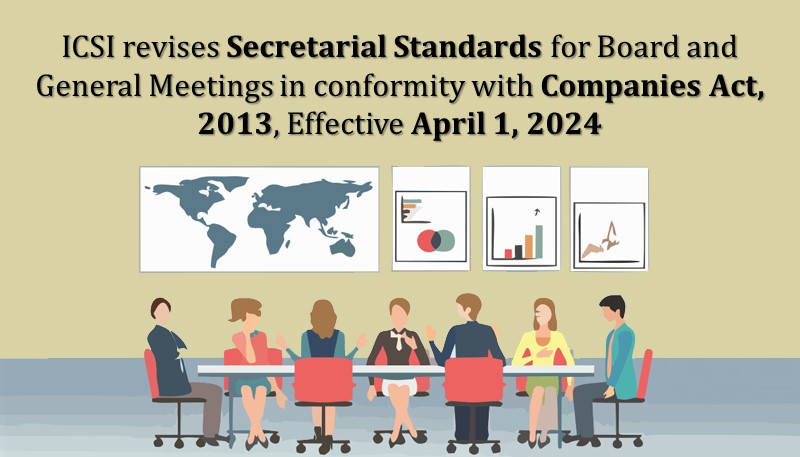With a view to align the secretarial standards with the provisions of the Companies Act, 2013 (Act or 2013 Act), which have been amended over the years[1], the Institute of Company Secretaries of India (ICSI) has revised the standards on Meetings of the Board of Directors (SS-1) and General Meetings (SS-2). Both will gain effect from 1.04.2024 making it imperative for all companies to take note of these immediately.
Secretarial Standards integrate, harmonize and standardize the diverse secretarial practices followed by corporates to promote uniformity and consistency and adopt the best secretarial practices prevalent the world over. Unlike the Companies Act, 1956 regime where secretarial standards were merely recommended, Section 118(10) of the 2013 Act mandates every company (except One Person Company in which there is only one Director on its Board and a company registered under Section 8) to observe the secretarial standards on Board and General Meetings. The exemption to a Section 8 Company and the specific exemptions given to a private company in these standards will be available only if it has not committed any default in filing its Financial Statements or Annual Return with the Registrar of Companies (ROC).
Given below are some of the key revisions to the two Secretarial Standards.
Key revisions in SS-1
- Directors can participate through electronic mode while discussing restricted items if there is a Quorum in a Meeting through physical presence of Directors. However, if the business to be transacted is for items which are not of a restricted nature, Directors attending the meeting through electronic mode will also be counted for the purpose of Quorum.
- A Director may intimate his intention of participation through Electronic Mode at the beginning of the Calendar Year which will be valid for such Calendar Year. However, this will not debar him from participation in the Meeting in person provided he gives such intimation sufficiently in advance to the company.
- Unpublished Price Sensitive Information (UPSI) will not include information relating to material events in accordance with the listing agreement.
- It will be sufficient if a Small Company, Dormant Company, or a private company which is recognized as ‘Start Up’ company holds one Meeting of the Board in each half of a Calendar Year and the gap between the two Meetings of the Board is not less than ninety days.
- For companies which are required to appoint Independent Directors (IDs) such IDs must hold at least one meeting in a financial year without the attendance of Non-independent Directors and members of management.
- In the case of a Private Company where Directors have shown his/her interest in any item of business, the Director will be reckoned for Quorum and will also be allowed to participate in the meeting for such items post disclosing his/her interest.
- In case of a Private Company, if the chairman is interested in any of the business items, he may continue to chair the meeting, be reckoned for Quorum, and entitled to participate in respect of such item once he/she discloses his interest for such item.
- The appointment of Directors in casual vacancies will be subject to the provisions of Articles of Association and to be subsequently approved in the immediate next general meeting.
Key revisions in SS-2
-
- An unlisted company can hold the Annual General Meeting (AGM) at any place in India, if prior consent is given by all the members in either in writing or by electronic mode is being obtained, and such consent should be to be received prior to the meeting.
- Extra-ordinary General Meetings (EGMs) may be held at any place in India, however a wholly owned subsidiary of a company incorporated outside India, EGMs may be held outside India.
- Notice accompanying documents may be given at shorter period if requisite consent of the members in writing is accorded thereto in physical mode or electronic mode:
- In case of AGM consent by not less than ninety-five percent (95%) of the members entitled to entitled to vote at such the meeting. Documents accompanying notice may also be given at shorter period if requisite consent of the members in writing or by electronic mode is accorded thereto.
- In case of Company having share capital- Consent by the majority in number of members entitled to vote and represent not less than ninety-five per cent of such part of the paid-up share capital of the company as gives a right to vote at the Meeting.
- In case of Company not having a share capital- Consent by the Members having not less than ninety-five per cent of the total voting power exercisable at such Meeting.
- In case of any other General Meeting:
- Companies having a share capital- Consent by the majority in number of members entitled to vote and represent not less than ninety-five per cent of such part of the paid-up share capital of the company as gives a right to vote at the Meeting.
- Companies not having a share capital- Consent by the Members having not less than ninety-five per cent of the total voting power exercisable at such Meeting.
- In case of AGM consent by not less than ninety-five percent (95%) of the members entitled to entitled to vote at such the meeting. Documents accompanying notice may also be given at shorter period if requisite consent of the members in writing or by electronic mode is accorded thereto.
- A Member, who is a related party, is not entitled to vote on a Resolution relating to approval of any contract or arrangement in which such Member is a related party, except in case of a company in which ninety percent or more Members, in number, are relatives of promoters or are related parties. In cases of wholly owned subsidiaries, resolution passed by the holding company will be sufficient for entering into transactions between wholly owned subsidiary and holding company.
- Items of business to be transacted by postal ballot only may be transacted at a general meeting by such companies which is required to provide e-voting facility to its members.
- Any resolution passed by postal ballot shall not be rescinded otherwise than by a resolution passed subsequently through postal ballot or passed at a General Meeting by a company which is required to provide e-voting facility to its members.
Written by: Kumar Bam Bam Co-authored by: Antara Dasgupta Disclaimer All material included in this blog is for informational purposes only and does not purport to be or constitute legal or other advice. This blog should not be used as a substitute for specific legal advice. Professional legal advice should be obtained before taking or refraining from an action as a result of the contents of this blog. We exclude any liability (including without limitation that for negligence or for any damages of any kind) for the content of this blog. The views and opinions expressed in this blog are those of the author/(s) alone and do not necessarily reflect the official position of Lexplosion Solutions. We make no representations, warranties or undertakings about any of the information, content or materials provided in this blog (including, without limitation, any as to quality, accuracy, completeness or reliability). All the contents of this blog, including the design, text, graphics, their selection and arrangement are the intellectual property of Lexplosion Solutions Private Limited and/or its licensors. ALL RIGHTS RESERVED, and all moral rights are asserted and reserved.





